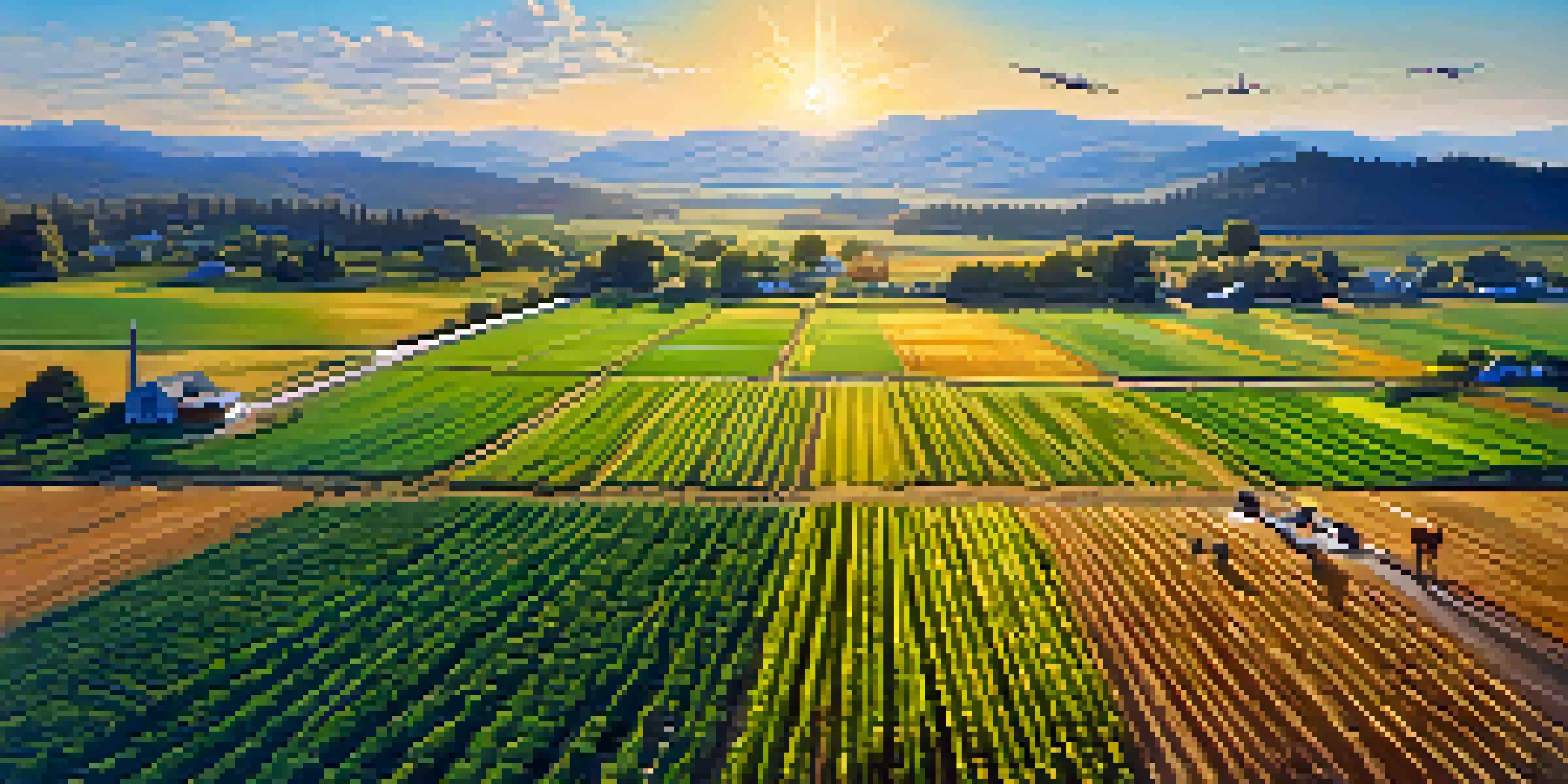The Future of Oregon's Economy: Trends and Predictions

Oregon’s Economic Landscape: An Overview
Oregon's economy is diverse, comprising industries like technology, agriculture, and tourism. Each sector contributes uniquely to the overall economic health of the state. For instance, while the tech industry is rapidly growing, agriculture remains a cornerstone, providing jobs and sustaining communities.
Sustainability is no longer about doing less harm. It's about doing more good.
In recent years, Oregon has seen a shift towards sustainability and eco-friendly practices, influencing how businesses operate. This shift not only reflects changing consumer preferences but also positions Oregon as a leader in green innovation. Such developments indicate a future where economic growth aligns with environmental responsibility.
As we look ahead, understanding the interplay between these sectors will be crucial. Businesses that can adapt and innovate within this dynamic landscape will likely thrive, shaping the future of Oregon's economy.
The Rise of Technology and Innovation
Technology is one of the fastest-growing sectors in Oregon, particularly in cities like Portland and Bend. Startups and established companies alike are harnessing innovation to create job opportunities and drive economic growth. For example, the tech scene is not just about software; it’s also making strides in renewable energy and biotechnology.

This surge in tech is attracting a young, skilled workforce, eager to contribute to groundbreaking projects. The presence of universities and research institutions further fuels this trend, fostering collaboration between academia and industry. As a result, Oregon is becoming a hub for tech talent and investment.
Diverse Economy Drives Growth
Oregon's economy thrives on a mix of technology, agriculture, and tourism, each contributing uniquely to its overall health.
Looking forward, we can expect continued growth in tech, with emerging fields such as artificial intelligence and machine learning taking center stage. This evolution will not only bolster the economy but also reshape the job market, requiring workers to adapt and upskill.
Agriculture: Balancing Tradition and Innovation
Agriculture has long been a staple of Oregon's economy, known for its diverse crops and sustainable practices. The state's farmers face the challenge of meeting rising consumer demand while adhering to environmental standards. Innovations in farming techniques, such as precision agriculture, are helping to bridge this gap.
The greatest danger in times of turbulence is not the turbulence; it is to act with yesterday's logic.
Farmers are increasingly adopting technology, from drones to data analytics, enhancing productivity and sustainability. This blend of tradition and modernity ensures that Oregon maintains its agricultural roots while evolving to meet future challenges. For example, organic farming and direct-to-consumer models are gaining traction.
In the coming years, the agricultural sector will likely focus more on sustainability, aiming for practices that not only yield profits but also protect the environment. This commitment to innovation will be essential for maintaining Oregon's agricultural heritage while adapting to global market trends.
Tourism: Adapting to New Norms
Tourism plays a significant role in Oregon's economy, with its stunning landscapes and vibrant culture drawing millions of visitors each year. However, the pandemic has reshaped the tourism sector, prompting businesses to rethink their strategies. Adapting to new health guidelines and shifting consumer preferences will be key to recovery.
The rise of outdoor and nature-based tourism is a trend that Oregon can capitalize on. With ample opportunities for hiking, biking, and exploring the great outdoors, the state is well-positioned to attract tourists looking for safe, outdoor experiences. Local businesses are already tailoring their offerings to meet this demand.
Green Energy Leads Innovation
Oregon's commitment to renewable energy not only supports environmental goals but also creates new job opportunities in emerging industries.
As the tourism industry evolves, there's potential for growth in eco-tourism and responsible travel. By promoting sustainability and unique local experiences, Oregon can enhance its appeal and ensure that tourism continues to be a vital part of the state's economy.
Green Energy: Paving the Way for a Sustainable Future
Oregon has been at the forefront of the green energy movement, with initiatives aimed at reducing carbon emissions and promoting renewable sources. The state's investment in solar, wind, and hydroelectric power not only supports environmental goals but also creates jobs in these emerging industries. This commitment to sustainability is becoming a core aspect of Oregon's economic identity.
As climate change continues to be a pressing global issue, demand for green energy solutions is expected to rise. Oregon's proactive stance on clean energy positions it to attract businesses and investments in this sector. For instance, companies focusing on renewable technologies are increasingly seeking to establish operations in the state.
Looking ahead, Oregon's green energy sector is likely to grow, providing new opportunities for innovation and employment. By continuing to prioritize sustainability, Oregon can lead by example in creating an economy that thrives while protecting the planet.
The Impact of Remote Work on Local Economies
The shift to remote work has changed the way many businesses operate, and Oregon is no exception. As companies embrace flexible work arrangements, the traditional office space is being redefined, impacting local economies. Smaller towns and rural areas are seeing an influx of new residents seeking a better quality of life away from urban centers.
This trend presents unique opportunities for local businesses, as these new residents contribute to the economy by supporting local shops and services. Additionally, communities can benefit from increased investment in infrastructure to accommodate the growing population. For example, improvements in internet connectivity are becoming essential.
Remote Work Reshapes Local Economies
The shift to remote work is transforming Oregon's local economies, attracting new residents and prompting businesses to adapt to changing demands.
However, this shift also poses challenges, such as the need for local economies to adapt to changing demographics and consumer behaviors. As remote work continues to shape Oregon's economic landscape, it will be essential for communities to embrace innovation and collaboration to thrive in this new environment.
Education and Workforce Development: Preparing for the Future
As Oregon's economy evolves, so too does the need for a skilled workforce. Education and training programs are critical in preparing workers for the jobs of the future, particularly in technology and green energy sectors. Collaboration between educational institutions and industries will play a vital role in shaping a workforce that meets the demands of a changing economy.
Initiatives aimed at promoting STEM education and vocational training are already making strides in Oregon. Schools and colleges are increasingly focusing on equipping students with the necessary skills to thrive in high-demand fields. For example, partnerships between community colleges and local businesses are helping to create tailored training programs.

Looking ahead, continuous investment in education and workforce development will be essential for Oregon's economic growth. By prioritizing skill-building and adaptability, the state can ensure that its workforce is ready to tackle the challenges and opportunities of the future.